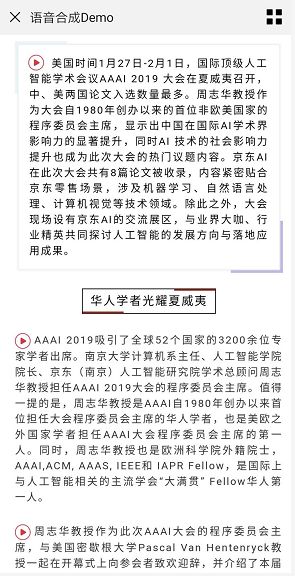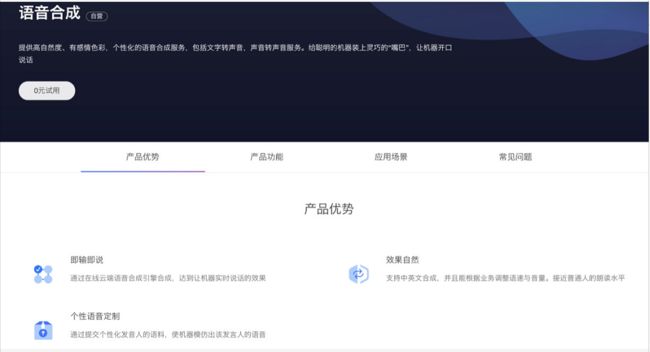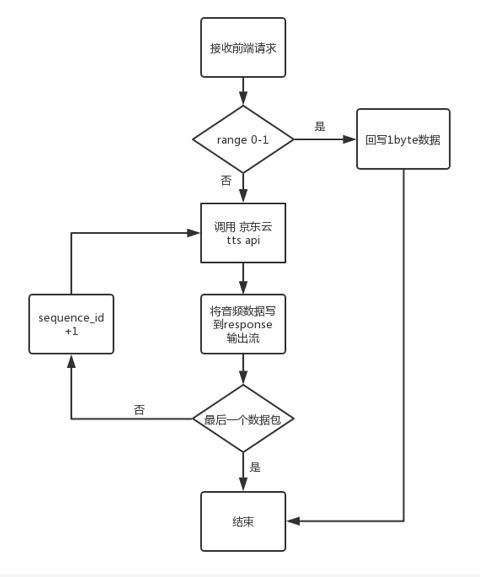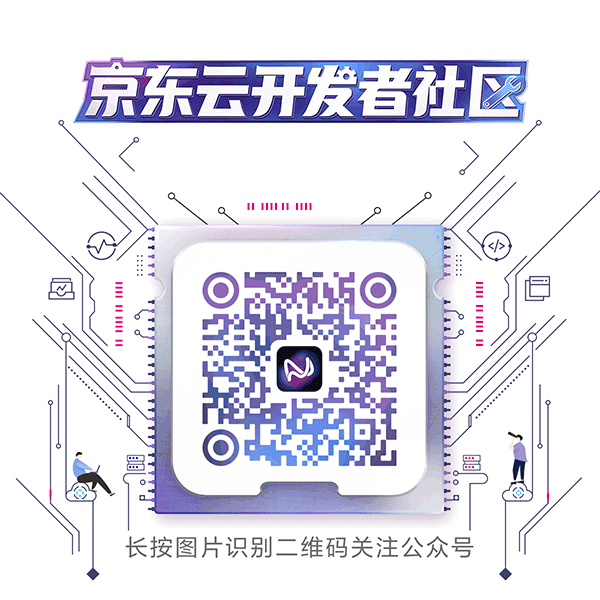京东云上提供了足够多的人工智能api,并且都使用了http的方式进行了封装,用户可以方便在自己的系统中接入京东云的ai能力。今天就是介绍一下如何编写很少的代码就能使用京东云的语音合成api在网页中实现文字朗读,最终实现效果,延迟小,支持主流设备,声调优美,还能男女生切换。
最终效果
最终效果,微信打开链接,点击播放按钮则可以进行文字朗读。
Api介绍
京东云AI API使用Restful接口风格,同时提供了java和python的sdk,使用sdk能够方便的封装参数,调用api获得数据。
为了提升调用方的响应速度,语音合成api采用了分段合成的模式,所以调用的时候在后端逻辑中按顺序多次调用,将音频数据以数据流的形式回写给前端。
获取AK/SK
访问京东云api需要获取 ak sk ,配合sdk使用;
进入京东云控制台-账号管理-Access Key管理,创建并获取Access Key。
后端音频流合成
这里给出后端部分源码,实现一个controller,开发一个get请求方法,参数封装的逻辑全都提炼出单独的方法,代码逻辑结构简单易懂。代码使用fastJson处理参数,另外引用了京东云sdk,其余都是jdk自带的api,依赖很少。
1 import com.alibaba.fastjson.JSON;
2 import com.alibaba.fastjson.JSONObject;
3 import com.wxapi.WxApiCall.WxApiCall;
4 import com.wxapi.model.RequestModel;
5
6 import org.springframework.stereotype.Controller;
7 import org.springframework.web.bind.annotation.GetMapping;
8 import org.springframework.web.bind.annotation.RequestHeader;
9
10 import javax.servlet.http.HttpServletRequest;
11 import javax.servlet.http.HttpServletResponse;
12 import java.io.IOException;
13 import java.io.OutputStream;
14 import java.util.Base64;
15 import java.util.HashMap;
16 import java.util.Map;
17
18 @Controller
19 public class TTSControllerExample {
20 //url appkey secretkey
21 private static final String url = "https://aiapi.jdcloud.com/jdai/tts";
22 private static final String appKey = "";
23 private static final String secretKey = "";
24
25 @GetMapping("/tts/stream/example")
26 public void ttsStream(
27 @RequestHeader(value = "Range", required = false) String range,
28 HttpServletRequest req,
29 HttpServletResponse resp) {
30
31 //应对safari的第一次确认请求携带header Range:bytes=0-1,此时回写1byte数据,防止错误
32 if ("bytes=0-1".equals(range)) {
33 try {
34 byte[] temp = new byte['a'];
35 resp.setHeader("Content-Type", "audio/mp3");
36 OutputStream out = resp.getOutputStream();
37 out.write(temp);
38 } catch (IOException e) {
39 e.printStackTrace();
40 }
41 return;
42 }
43 //封装输入参数
44 Map queryMap = processQueryParam(req);
45 String text = req.getParameter("text");
46 //封装api调用请求报文
47 RequestModel requestModel = getBaseRequestModel(queryMap, text);
48 try {
49 //回写音频数据给前端
50 writeTtsStream(resp, requestModel);
51 } catch (IOException e) {
52 e.printStackTrace();
53 }
54 }
55
56 /**
57 * 将前端输入参数封装为api调用的请求对象,同时设置url appkey secaretKey
58 * @param queryMap
59 * @param bodyStr
60 * @return
61 */
62 private RequestModel getBaseRequestModel(Map queryMap, String bodyStr) {
63 RequestModel requestModel = new RequestModel();
64 requestModel.setGwUrl(url);
65 requestModel.setAppkey(appKey);
66 requestModel.setSecretKey(secretKey);
67 requestModel.setQueryParams(queryMap);
68 requestModel.setBodyStr(bodyStr);
69 return requestModel;
70 }
71
72 /**
73 * 流式api调用,需要将sequenceId 依次递增,用该方法进行设置请求对象sequenceId
74 * @param sequenceId
75 * @param requestModel
76 * @return
77 */
78 private RequestModel changeSequenceId(int sequenceId, RequestModel requestModel) {
79 requestModel.getQueryParams().put("Sequence-Id", sequenceId);
80 return requestModel;
81 }
82
83 /**
84 * 将request中的请求参数封装为api调用请求对象中的queryMap
85 * @param req
86 * @return
87 */
88 private Map processQueryParam(HttpServletRequest req) {
89 String reqid = req.getParameter("reqid");
90 int tim = Integer.parseInt(req.getParameter("tim"));
91 String sp = req.getParameter("sp");
92
93 JSONObject parameters = new JSONObject(8);
94 parameters.put("tim", tim);
95 parameters.put("sr", 24000);
96 parameters.put("sp", sp);
97 parameters.put("vol", 2.0);
98 parameters.put("tte", 0);
99 parameters.put("aue", 3);
100
101 JSONObject property = new JSONObject(4);
102 property.put("platform", "Linux");
103 property.put("version", "1.0.0");
104 property.put("parameters", parameters);
105
106 Map queryMap = new HashMap<>();
107 //访问参数
108 queryMap.put("Service-Type", "synthesis");
109 queryMap.put("Request-Id", reqid);
110 queryMap.put("Protocol", 1);
111 queryMap.put("Net-State", 1);
112 queryMap.put("Applicator", 1);
113 queryMap.put("Property", property.toJSONString());
114
115 return queryMap;
116 }
117
118 /**
119 * 循环调用api,将音频数据回写到response对象
120 * @param resp
121 * @param requestModel
122 * @throws IOException
123 */
124 public void writeTtsStream(HttpServletResponse resp, RequestModel requestModel) throws IOException {
125 //分段获取音频sequenceId从1递增
126 int sequenceId = 1;
127 changeSequenceId(sequenceId, requestModel);
128 //设置返回报文头内容类型为audio/mp3
129 resp.setHeader("Content-Type", "audio/mp3");
130 //api请求sdk对象
131 WxApiCall call = new WxApiCall();
132 //获取输出流用于输出音频流
133 OutputStream out = resp.getOutputStream();
134 call.setModel(requestModel);
135 //解析返回报文,获得status
136 String response = call.request();
137 JSONObject jsonObject = JSON.parseObject(response);
138 JSONObject data = jsonObject.getJSONObject("result");
139 //第一次请求增加校验,如果错误则向前端回写500错误码
140 if (data.getIntValue("status") != 0) {
141 resp.sendError(500, data.getString("message"));
142 return;
143 }
144 //推送实际音频数据
145 String audio = data.getString("audio");
146 byte[] part = Base64.getDecoder().decode(audio);
147 out.write(part);
148 out.flush();
149 //判断是否已结束,多次请求对应多个index,index<0 代表最后一个包
150 if (data.getIntValue("index") < 0) {
151 return;
152 }
153 //循环推送剩余部分音频
154 while (data.getIntValue("index") >= 0) {
155 //sequenceid 递增
156 sequenceId = sequenceId + 1;
157 changeSequenceId(sequenceId, requestModel);
158 //请求api获得新的音频数据
159 call.setModel(requestModel);
160 response = call.request();
161 jsonObject = JSON.parseObject(response);
162 data = jsonObject.getJSONObject("result");
163 audio = data.getString("audio");
164 part = Base64.getDecoder().decode(audio);
165 //回写新的音频数据
166 out.write(part);
167 out.flush();
168 }
169 }
170
171
172
173 前端audio播放朗读
174 前端部分给出在vue 模块化开发中的script部分,由于采用html5的audio进行语音播放,为了兼容性需要引用howler.js (npm install howler),主要逻辑为根据设置的参数和待朗读的文字拼接一个url,调用howler.js 中的api进行播放。
175
176
看完这个操作文档是不是跃跃欲试?对AI也想了解更多?
本周六我们为大家准备了【从“智慧零售”到“无人仓储”,揭秘京东人工智能技术的实践与应用】“京东云技术沙龙AI专场 ”!现场将会有技术专家为大家答疑解惑。
![]()
点击“阅读原文”即可免费报名参加哦!






